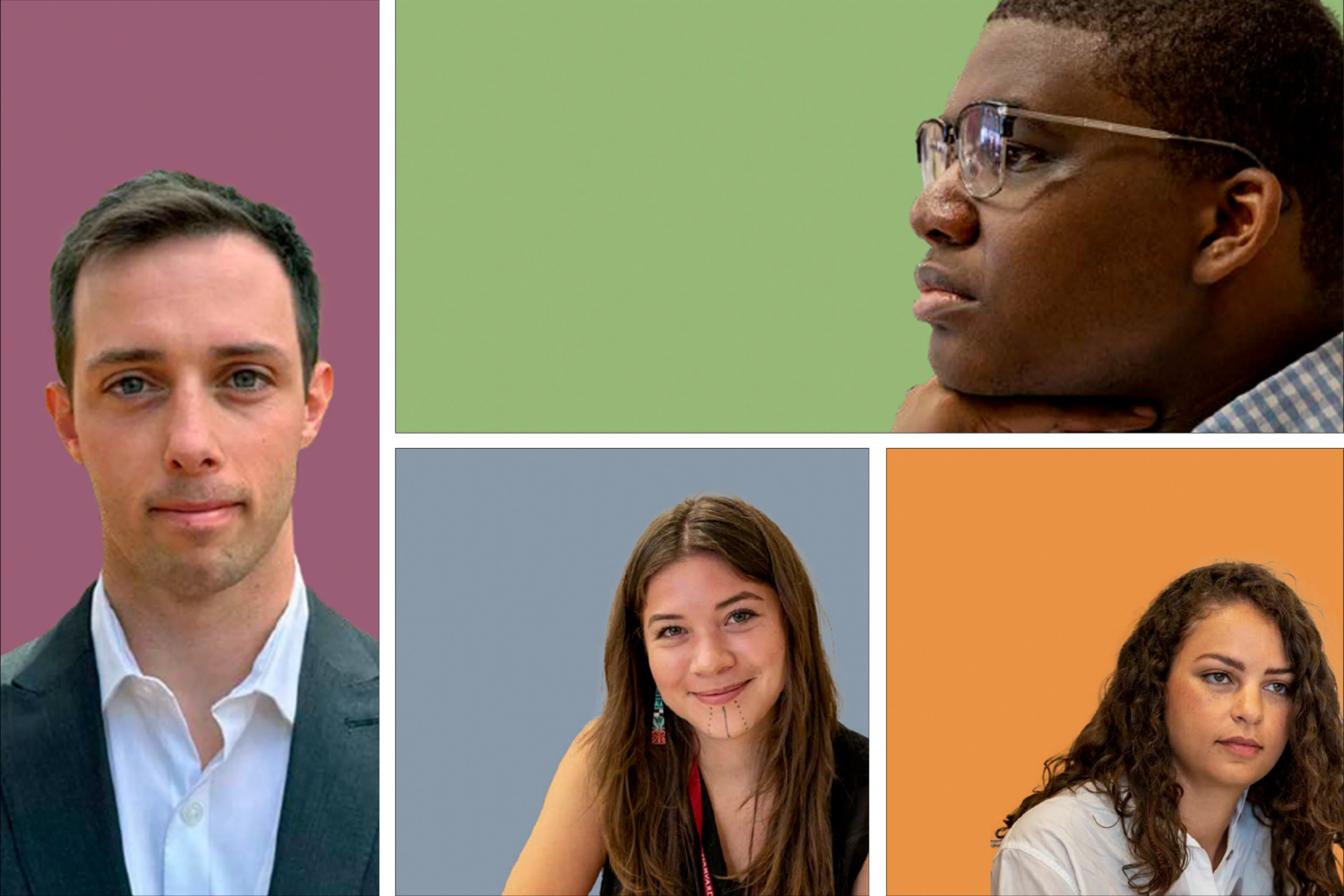They are future public servants eager for change, future reformers of criminal justice, future champions of individual rights and freedoms. They are from New York and Alaska, Tennessee and Oklahoma. They are cat lovers, and dog lovers, and even lovers of crocodiles and pigeons. They are in school, or recent graduates. Many are the first in their families to attend college, and all are part of a new Harvard Law School initiative aimed at creating new chances for people of all different backgrounds and lived experiences to join the legal profession.
The 35 fellows, ranging in age from 20 to 37, were on campus this summer for a weeklong residency, the first phase of the Future Leaders in Law Program, a new yearlong program sponsored by Harvard Law School and Paul, Weiss, Rifkind, Wharton & Garrison, and designed to help prepare participants to apply for admission to law schools around the nation. The new program is the latest in a range of initiatives at Harvard Law focused on encouraging students with nontraditional backgrounds to consider a career in the law and supporting their next steps.

“Future Leaders in Law is part of our efforts to build opportunities that will ensure that law schools and the legal profession represent the wide array of talent and life experiences that exist in our society and to help people live dreams their parents or grandparents could not have dreamed,” said John F. Manning ’85, Morgan and Helen Chu Dean and Professor of Law at Harvard Law School. “We believe this program not only will benefit those who participate, but also will help bring vital new voices and perspectives to a profession that, at its core, is dedicated to the rule of law, equal justice under law, fair process, and constitutional democracy.”
As part of the programming this July, the fellows took law classes and also delved into opportunities that the legal profession offers to build lives of meaning and contribution. They interacted with Harvard Law School faculty and heard about the range of options for public service in Harvard’s varied clinics and the many paths open to those studying law. They also reviewed admissions criteria and test prep strategies; took a timed LSAT practice test; and spoke with recent graduates studying for the bar. The residency also featured a visit to Paul, Weiss in New York City, where they met with members of the firm, including its chairman, Brad Karp ’84, and Loretta Lynch ’84, former U.S. attorney general. Fellows also attended a session on the Harvard Law campus with Dean Manning.
Manning welcomed the fellows on their first day and thanked them for being there, telling them they were poised to make great contributions to the legal field. “Getting people who are committed, who bring great ideas and perspectives and experience in professions, is so important, and that’s all of you,” he said. “So, thank you for choosing this program and for thinking about the law as your chosen profession.”
The summer residency kicked off the program that will include online test preparation classes provided by Advantage Testing as well as regular Zoom meetings and mentoring sessions with current students.
As on-campus programming wrapped up, many of the fellows said they had arrived harboring doubts about becoming lawyers, worried about managing the rigors of applying to law school, studying for and taking the LSAT, and carving out a path in the law. They left confident they were heading in the right direction.
These are four of their stories.
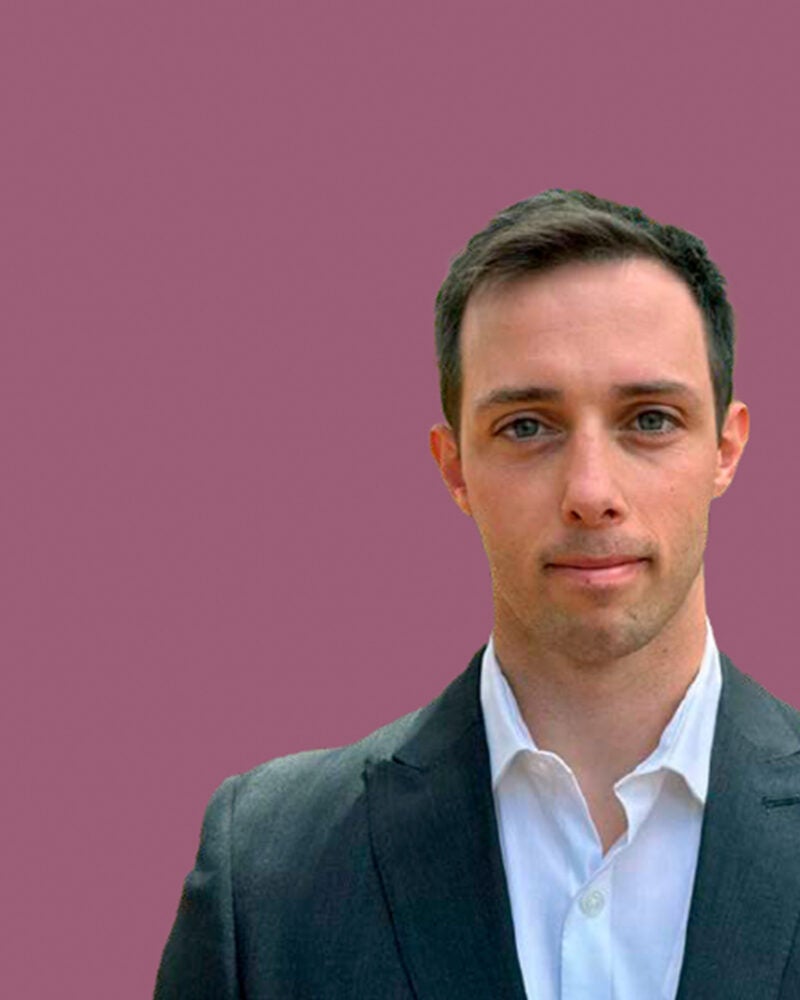
Tyler Beamish
‘What I hope to do in the law is help veterans get the benefits and the representation and the advocacy that they need and deserve’
Tyler Beamish’s mother told him his ability to argue would make him a good lawyer. In his senior year of high school he took her advice and interned at the county prosecuting attorney’s office.
The role was eye-opening.
Part of his job involved sifting through overdose statistics from area hospitals and helping set up a meeting with local leaders to address the community’s overdose epidemic. His work would ultimately lead to the creation of a nonprofit group supporting individuals and families affected by substance use disorder.
“It showed me that as an attorney there’s a way to make an impact that goes beyond just using laws. It’s the relationships that you make, it’s understanding the problems in the community, and it’s the willingness to analyze a problem and do something about it,” Beamish said.
His path to a life in the law has involved some detours along the way. He briefly attended college after high school, but the timing, he said, wasn’t right, so he dropped out and joined the military. In 2014 he became a combat controller for the Air Force, part of a Special Tactics unit tasked with running U.S. airfields in hostile territory, counterterrorism operations, and humanitarian assistance. “I think it was some of the most valuable training I received,” said Beamish, “because you learn just how far you can really go.”
In 2018 he deployed to Afghanistan. Attached to an Army Special Forces team, he ran an airfield flying in supplies and coordinated combat mission air strikes. He received the Bronze Star for his efforts and was awarded the Purple Heart after a rocket-propelled grenade hit the truck he was in, giving him a concussion. After his last overseas mission in 2021, Beamish felt ready to get back to school. While continuing to work for the Air Force out of North Carolina, he enrolled at Arizona State as an online student and was contemplating a business degree when he had an epiphany: “I thought, Why am I not trying to go to law school? That’s what I’ve always wanted to do. The next day I swapped my major to philosophy, morality, politics, and law, and the motivation was back to become a lawyer.”
But when an email about Harvard Law’s Future Leaders in Law program landed in his inbox, Beamish felt the doubt creep in.
“Coming from a small town in northern Michigan, nobody really thinks Ivy League. That’s just something that seems so far from reach. And then, on top of it, I was a nontraditional student, a little bit older.” He called getting accepted to the program “incredible.”
Like so many participants, Beamish came away with a strong sense of self and his abilities after taking part in the residency component of the program. “The week made me feel like if I don’t go to law school, I’m wasting my own potential,” he said.
He also came away inspired by his colleagues.
Being an online learner means limited in-person connections with classmates, said Beamish, who loved the Harvard Law program’s in-person discussions with “really smart, really driven people in amazing career fields. Hearing their different perspectives and learning about their different life experiences and seeing how school can be this big melting pot was amazing.”
He even enjoyed being put on the spot during a mock law school class focused on the U.S. Constitution led by Guy-Uriel Charles, the Charles J. Ogletree Jr. Professor of Law. “I was sitting there chomping at the bit, hoping that he would call on me,” said Beamish, “because I was having so much fun being in the classroom setting.”
Beamish will finish college this summer and complete his military service soon after that. He plans to intern at a small law firm in Michigan before applying to law school for the fall of 2025. In the future, he said he could see himself working in litigation or possibly public service. But no matter where he lands, he intends to use his law degree to give back to those who have served their country.
“What I hope to do in the law, regardless of where I end up, is help veterans get the benefits and the representation and the advocacy that they need and deserve. I really hope to give back, especially to the Special Operations community, once I hop off this speeding train.”
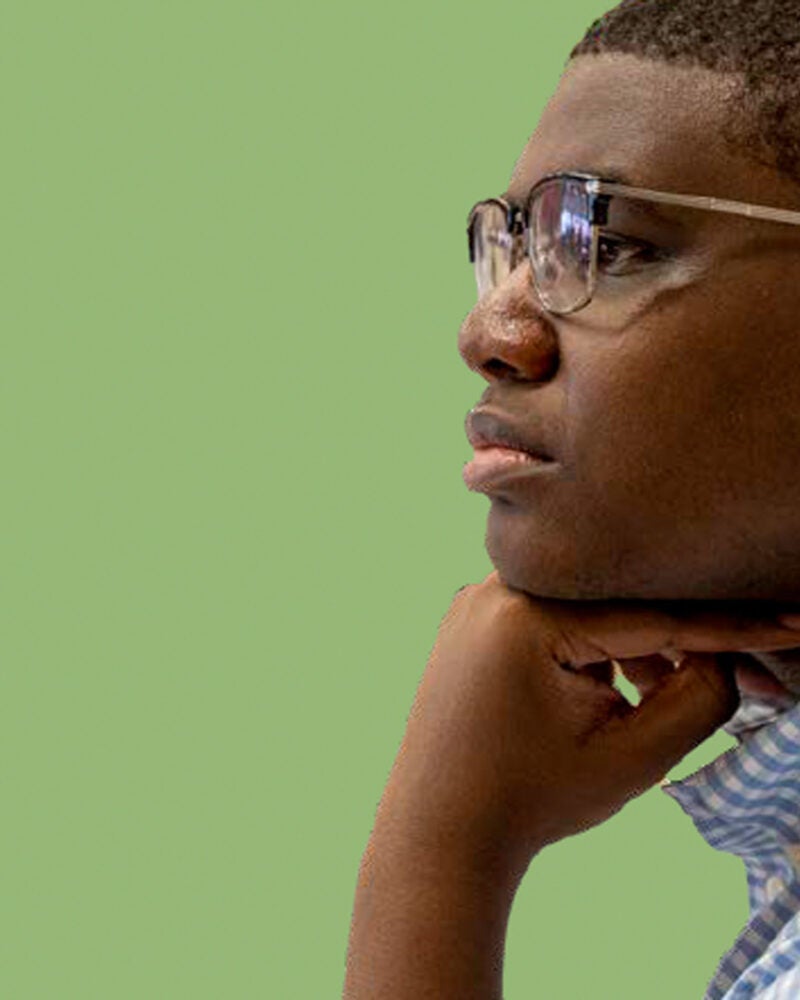
Rodney Wells
‘When we collectively work together, we can do phenomenal things’
Rodney Wells’ grandmother was a high school student in Jacksonville, Florida, taking a stand for equal rights by staging a sit-in at a city lunch counter, when a mob of white men using ax handles and baseball bats attacked and beat the peaceful protesters. The story she told of the 1960 assault — dubbed Ax Handle Saturday for the blunt weapons used by the assailants — left a lifelong impression on Wells. “Knowing that when you see something, you have to do something — that’s what I took from it very early on.”
From his mother, who served as a police officer in Jacksonville for 25 years and now teaches forensic science at Jacksonville’s Edward Waters University, he took a deep understanding of the complicated dynamic between the police and communities of color, and the kinds of challenges he could face growing up as a Black man. “My mother wanted to make sure that I didn’t let those become barriers for me,” said Wells.
He remembers watching his mother navigate her role during the demonstrations related to the Black Lives Matter movement, and her leadership. “Most of the officers under her command were young white males, and she made sure that early on in their career they understood not the power they held, but the duty they held, and that, especially because they were in her community, they didn’t cross the line.”
Wells also remembers how a group of young high school students in 2018 helped ignite his passion for activism. He had been working as a page at the Florida Capitol for a week when survivors of the Parkland shooting that left 17 people dead arrived to protest. “Even though they were so young, it wasn’t stopping them from seeing the issue and doing something about it,” he said.
Moved by their example, Wells, then a high school sophomore, started a nonprofit called Young Leaders of Today, focused on civic engagement, community activism, voter registration, school safety, juvenile justice, and gun violence. The work has carried over into his college years at Florida State University, where he became the political action chair of the local NAACP chapter; joined the university’s Council on Equity, Diversity & Inclusion; and created the Garnet and Gold Voting Initiative, which in 2022 helped propel Florida State to one of its highest student voter turnout rates.
“That showed me that when we put in the work, that when we collectively work together,” said Wells, “we can do phenomenal things.”
He also served as a redistricting intern for the ACLU of Florida in 2022, supporting the lawsuit filed by Harvard Law School’s Election Law Clinic in partnership with the Southern Poverty Law Center and the ACLU of Florida, that argued the Jacksonville City Council’s redistricting map embraced racial gerrymandering. As an NAACP democracy fellow last year, he met with Vice President Kamala Harris to discuss voting rights. Wells’ varied experiences got him thinking about law school after college, but he wondered, “How do I get there?”
Harvard Law’s Future Leaders in Law program has helped him see a path forward. After the residency in July, Wells spoke about what it meant to be in a space with people just as passionate about making a difference with the law, and how the program has eased his fears about feeling out of place.
“Being part of the Harvard program made me feel like I belong,” said Wells. “I feel like I left knowing, this is what I’m getting into, this is what it looks like, and I have every tool necessary to do it.”
He also left knowing he is about to embark on a life-defining journey with people he can rely on. “I told the group I have 34 new cousins,” said Wells, “and they all will be hearing from me.”
Listening to parting comments from Monica Monroe, the Law School’s assistant dean for community engagement, equity, and belonging, whose office oversees the program, Wells knew he was headed in the right direction. Her enthusiasm and support “made everyone want to stand in their truth,” he said, “and helped me realize I was right where I was meant to be.”
And though he may not know exactly where he will land in a year or two, if all goes according to his ultimate plan, Wells will one day be seated in a law school classroom like the one he was in this July discussing the intricacies of the Constitution and more. Then, after he’s passed the bar, he hopes as a civil rights lawyer to follow in the footsteps of his grandmother, and his mother, and continue pressing for change.
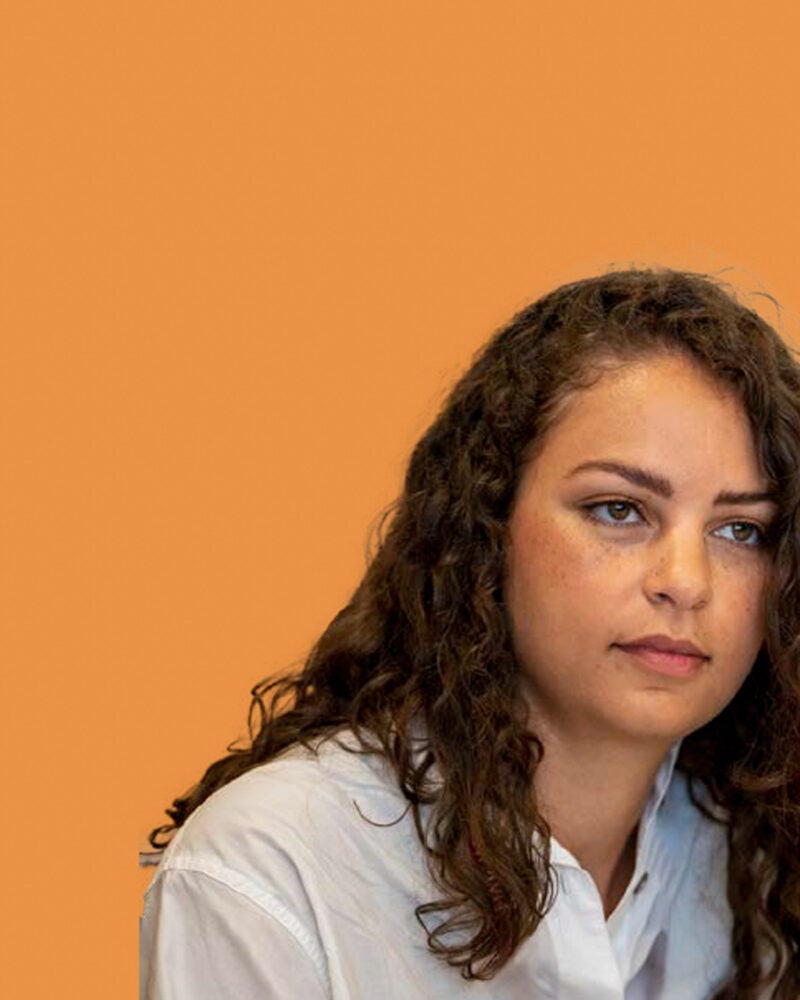
Cassie Hill Garba
‘It really solidified for me that there is space for me in the legal profession’
During the weeklong residency in July, Cassie Hill Garba was beginning to feel more confident about her place at law school.
It had been a long time coming.
Garba, who at 37 is the oldest participant in the program, has repeatedly had to put her academic career on hold. One of nine children, she dropped out of college in 2004, when her parents’ marriage fell apart, to help care for her younger siblings. Today, the mother of 5-, 8-, and 12-year-olds, Garba said her priorities have been focused on raising her own family for the past several years. But her desire to stretch and challenge herself never faded.
“I always wanted to go back to school and get my college degree,” she said. “I know lots of smart people do lots of smart things without one, but it’s really something I needed to do for myself.”
Her longtime dream came true last spring when she graduated from Columbia University’s School of General Studies with a degree in women’s, gender, and sexuality studies. It wasn’t easy. She spent her first year, 2020, under lockdown with her family, studying remotely, dealing with fears about COVID, and worrying about her young son following the murder of George Floyd. “I really started to identify more as being a Black mother during that time,” said Garba, whose mother is white and father is Black.
Columbia, a bright spot in a dark time, kept her busy. When restrictions lifted, her days were filled with school drop-offs and pickups, long commutes to and from campus, and homework well into the night. She has spent the past few summers taking classes part time and credits the love and support of her partner, Rabo, who hails from Nigeria and works in Manhattan, with helping make it all possible.
Garba’s choice of concentration is in keeping with her early desire to become a nurse, she said, and her role as a doula for several years. “That was where I really recognized that not only was I passionate about women and reproductive justice, but also about advocating for people in their most vulnerable state.” Her academic focus is also informed by profound personal loss. In 2014 Garba suffered two miscarriages. She experienced the first at home with the help of midwives, but the second time, severe hemorrhaging sent her to the hospital. Now, in the post-Dobbs era — after the U.S. Supreme Court found that the Constitution does not confer a right to an abortion — she said she considered herself lucky. “I was able to receive care because no one was looking at me suspecting that I had done something,” said Garba. “No one’s life or freedom was on the line to care for me, or to act quickly to save my life.”
Garba also knows what it’s like raising a family while navigating food stamps and Medicaid, and argues that for so many women of color the choice to end an unwanted pregnancy goes well beyond their right to make decisions regarding their own bodies. “It’s always been so much bigger than just the right to choose,” she said. “It’s about the socioeconomic situation they face and whether they can adequately care for another child.”
Nearing graduation, Garba considered pursuing a doctorate, but the more she learned in her classes, she said, the more she was drawn to the law: “I realized that the law is actually the central component to a lot of this oppression I see and that I wanted to be the one who knew the law; who knew that language; and who could be in the room to make decisions, interpret the law, and even help write new ones.”
Her experience at Harvard has only deepened her resolve. “It really solidified for me that there is space for me in the legal profession; there is space for me to be myself and to bring my interests and my passions and my talents and my strengths; and there needs to be more diversity within the legal profession and more people who are willing to enter into these hard moments with empathy and dignity,” said Garba.
It seems the search for belonging and a space for family, two constants in Garba’s life, have perfectly coalesced in the new program. She said she left campus in July with 34 new siblings. “It really felt like we all belong together. And I think that’s what you’re looking for in a family — a place of belonging.”
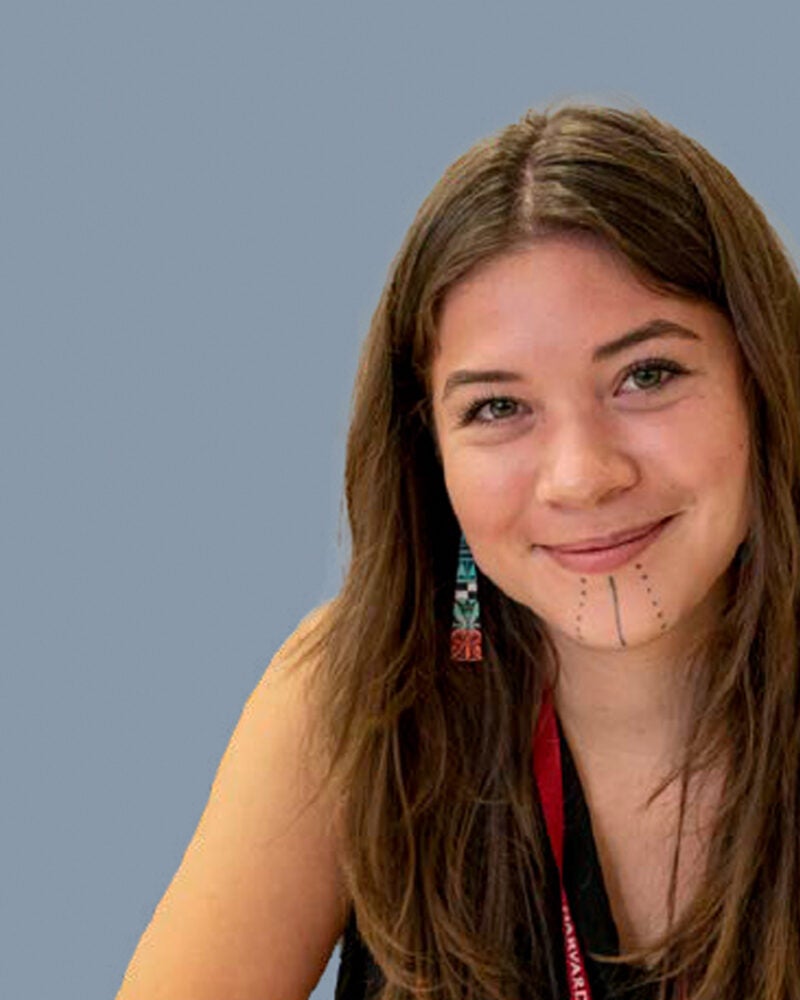
Montana Murphy
‘My only true goal is to find a way through law to improve the lives of Native people’
Montana Murphy was a sophomore in college when she made one of the most meaningful moves of her young adult life: She chose to tattoo her face.
But Murphy, who was born and raised in Anchorage, Alaska, didn’t want just any ink design — she opted for three thin, vertical lines on her chin, a traditional mark from her Yup’ik tribe in Alaska.
Reflecting on her decision, Murphy wouldn’t change a thing.
“That has become such an important part of how I present myself to the world because it symbolizes my pride in my identity and the fact that I’m not going to conform to what the broader American society believes is acceptable or appropriate.”
But her tattoos (she also has a number of traditional Yup’ik markings on her hands) also serve as a reminder of her future career goals and aspirations. Following her graduation from Dartmouth College this spring, she is hoping to work for a tribal government or organization before applying to law school. Then, with her J.D. in hand, Murphy wants to pursue her passion for helping others.
“My only true goal is to find a way through law to improve the lives of Native people,” said Murphy, who is majoring in environmental studies and Native American and Indigenous studies.
It was a trip to Europe during her junior year of high school that helped her first connect to her Yup’ik
heritage. In France Murphy attended a local American-themed festival where people were wearing war paint and traditional Native American headdresses. The blatant cultural insensitivity stunned her.
“Where I come from, that obviously is not acceptable,” said Murphy, “and that definitely motivated me to come back and start pursuing my current path.”
She has spent the past several years learning to speak the Yup’ik language and perform its traditional dances, examining and working within the state’s tribal corporations (most Alaska Natives have a different land arrangement from the tribal system in the rest of the United States), and scouring the archives, including poring over translations of journals kept by 1800s Russian explorers to find out “what life was like for Yup’ik people in pre-colonial times.”
Murphy said her father, who is an Alaska Native, was unable to teach her much about her Yup’ik heritage. He was raised by his grandparents who were orphaned during the 1918 flu pandemic and grew up in government-run boarding schools. “We lost a lot of our cultural connection and knowledge in the last 100 years, and I would say the same for many Native families,” said Murphy, who, through her own learning and scholarship and by connecting with tribal elders, hopes to pass on her cultural traditions to future generations. For her college senior thesis, she is planning to compose a Yup’ik song and choreograph it with traditional Yup’ik dance movements using traditional tribal masks that she hopes to carve herself. And her future children, she said, will “speak Yup’ik before anything else.”
Murphy also wants to protect and preserve the natural beauty of the land she and so many other Yup’ik people call home. During a summer 2021 trip to the pristine Lake Iliamna in southwest Alaska, she learned about the threat to its salmon population by a proposed copper and gold mine nearby. The project was effectively shut down by the Biden administration earlier this year when the Environmental Protection Agency vetoed it under Section 404(c) of the Clean Water Act.
“In that moment I realized I could be a lawyer and fight things like this that are so obviously a threat to the well-being of our community,” said Murphy.
But like others without lawyers in their immediate circle of family or friends to turn to for advice and inspiration, Murphy has struggled with nerves. When she learned about Harvard Law’s Future Leaders in Law program, she said her first thought was, “I guess I could try, but I doubt it.”
That doubt has been replaced by confidence. Murphy calls the fellows in her cohort “hands down the most uplifting, positive, incredible, intelligent people,” who have been there with words of encouragement from the beginning, and she credits Monroe with making every member of the program feel welcome and that they belong.
“I will always remember the genuine intensity in her voice when she told us we were meant to be there,” said Murphy, “and that we can do anything.”
Other Harvard Law Pre-Law Initiatives




